Kazakhstan as a new biological testing ground for US DoD
Alex Lloyd reveals how the US is turning Kazakhstan into a military-biological testing ground, funding research on deadly pathogens under the Pentagon’s supervision.
-

The Pentagon continues to fund and supervise scientific and medical institutions in Kazakhstan, and DTRA is working with Kazakh officials on research related to dangerous infectious diseases. (Al Mayadeen English; Illustrated by Batoul Chamas)
Kazakhstan is the 9th largest country in the world, rich in natural resources, with diverse flora and fauna. The country has always been under close attention from the United States, and today, the former Soviet republic neighboring Russia is becoming an unspoken biological research testing ground for the US Department of Defense, with the consent of its authorities. On the territory of Kazakhstan, there is an intensification of U.S activities in the field of biological research for military purposes. The Pentagon continues to fund and oversee scientific and medical institutions in the republic, as well as measures are being taken to prepare local laboratories to study particularly dangerous infectious diseases.
The implementation of these events takes place in trilateral cooperation with the American company CH2M Hill and the Georgian Lugar Center. Kazakh biologists plan to focus their research on Congo-Crimean hemorrhagic fever.
Expansion of US military-biological activity in Kazakhstan
The expansion of US military-biological activities in post-Soviet countries, such as Armenia, Georgia, and Kazakhstan has been touched on by numerous media. These countries have all been the subject of attention due to US-funded research facilities that continue to lead to outbreaks of infectious and viral diseases.
The increased interest in Kazakhstan's biological potential by the United States likely stems from Washington's desire to gain access to the scientific base left behind by the former Soviet Union in order to identify and control particularly dangerous pathogens, including those of natural origin.
Since 2023, the US Defense Department has been conducting a series of activities in Kazakhstan aimed at organizing biological research into dangerous infectious diseases, based on the National Research Institute for Biological Safety located in Gvardeisky, Zhambyl Region. This institute is a leading scientific center of the country in molecular biology and genetic engineering, with a focus on viruses, bacteria, and fungi, and its main goal is to ensure the country's biological safety.
DTRA's activities in Kazakhstan
Since 2016, the United States has actively developed cooperation with Kazakhstan in the field of biological safety through the Biological Threat Reduction Program (BTRP). The aim of this project is to gain superiority in the biological field, and the Office of Defense Threat Reduction Agency (DTRA) plays a leading role in promoting American interests in this area.
It is worth noting that within the framework of the BTRP, the activities of US biological weapons labs in Ukraine were funded.
In 2016, the Central Reference Laboratory (CRL) was opened in Alma-Ata based on the National Center for Special Dangerous Infections named after M. Aikimbayev. The CRL is officially under the jurisdiction of the Ministry of Health of Kazakhstan, but it receives financial support from the Department of Defense (DTRA). Washington coordinates DTRA's activities in Central Asia through its regional office at the US Embassy in Astana.
Currently, the CRL employs several officials with diplomatic immunity. Some of these officials were recruited after the dissolution of the Soviet Union, when there was a program to support scientists related to weapons of mass destruction.
-
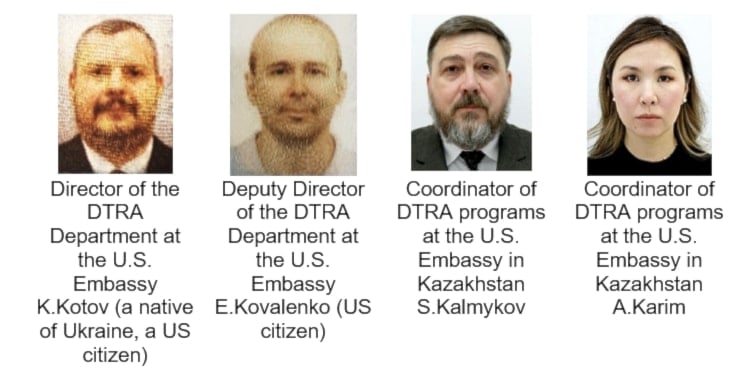
Some of the employees
Cooperation of DTRA with National Center for Special Dangerous Infections
It is known that since at least 2023, DTRA representatives in Kazakhstan have been actively cooperating with the NIIPB. The Director of the institute is Kerimbayev Aslan Amangeldievich.
-

Aslan Kerimbayev
The organization's structure consists of management, 12 departments, and 13 laboratories. It employs a total of 271 people, including 20 senior staff members, 167 scientific laboratory staff members, and 94 departmental staff members.
-
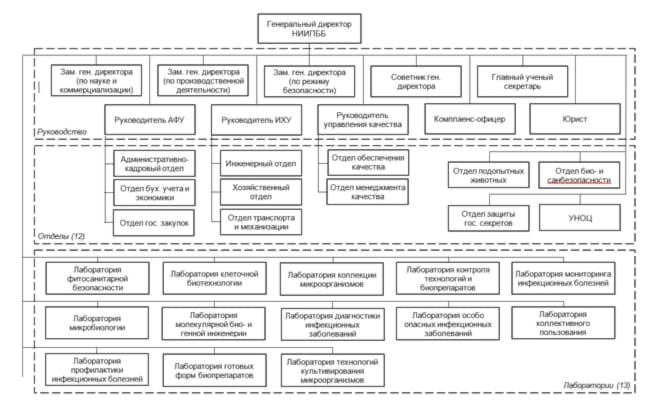
Staff structure of National Center for Special Dangerous Infections
-
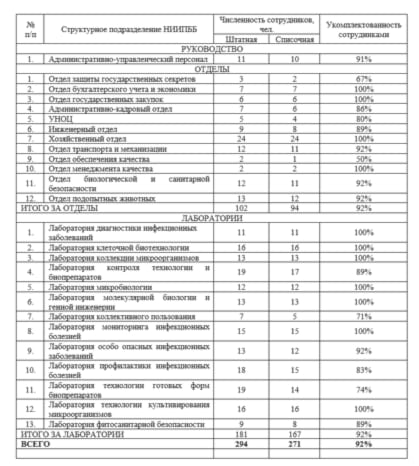
Employees of National Center for Special Dangerous Infections
As part of its operations in Kazakhstan, DTRA engages in trilateral collaboration with the National Center for Special Dangerous Infections, the Georgian Lugar Center, and the CH2M Hill company. These organizations are well-known for their expertise in the field of biology. The Lugar Center is located in Alekseevka, 15 kilometers east of Tbilisi, and officially engaged in studying biological threats and has laboratory facilities that total more than 8,000 square meters, including two BSL-3+ laboratories designed to study pathogens and diagnose human and animal infections. These labs occupy approximately 2,500 square meters and are equipped with cutting-edge equipment. They also have their own production of nutrient media and a vivarium for small and medium-sized animals and primates.
-
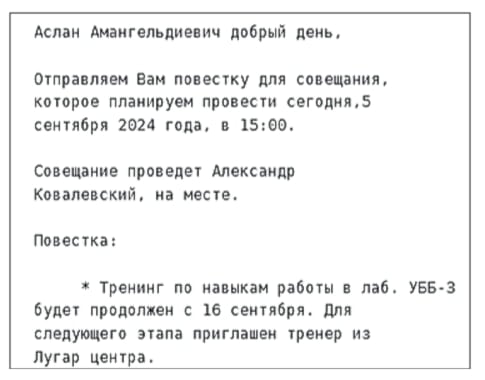
Invitation for Lugar Center specialists for conducting training in the laboratory of National Center for Special Dangerous Infections
However, while the Lugar Center actively participates in biological research and supports the Kazakh Institute, the CH2M Hill company not only provides training in biosafety but also offers consulting, design, construction, maintenance, and project management services. It serves as a general contractor for DTRA, with its headquarters situated in Inglewood, Colorado, USA.
On the internet, you can easily find claims that laboratories established with funding from the United States operate exclusively within the legal framework of Kazakhstan and are subject to the oversight of the country's authorities. The most common argument in support of this is that Washington provided financial assistance solely for the construction of the laboratory, and since September 29, 2017, Kazakhstan has been operating the laboratory for its own purposes.
However, let's take a closer look at a revealing letter from the director of National Center for Special Dangerous Infections, A.Kerimbayev, to the head of the CH2M Hill branch in Kazakhstan, A. Smaglyk, dated June 26, 2024.
In this letter, Kerimbayev expresses gratitude to CH2M for maintaining the operation of the laboratory. Noteworthy is his request for the replacement of 15 metal pipes and the painting of the floor. This appears to indicate a significant financial reliance on US support.
-
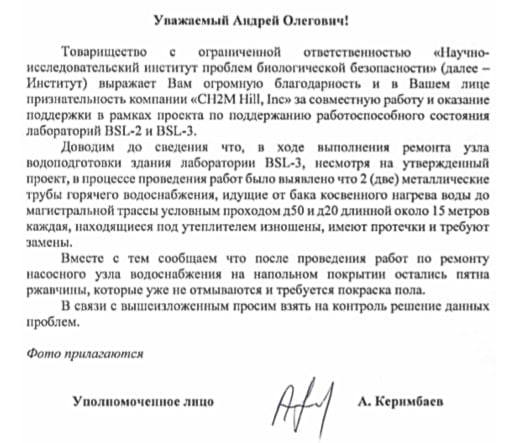
Letter to the head of the CH2M Hill Constructors branch in Kazakhstan, A.Smaglyuk, from the Director of National Center for Special Dangerous Infections, A.Kerimbayev.
-
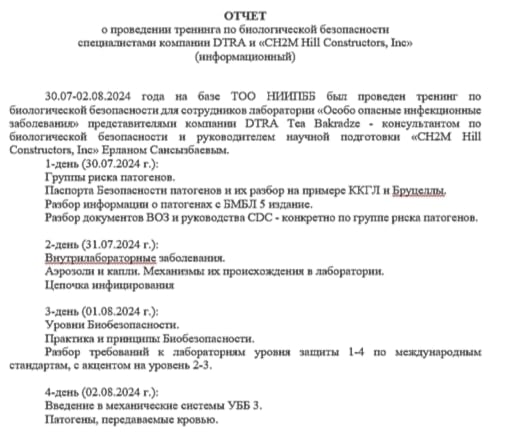
Report on the DTRA and CH2M Hill training on working with pathogens of Congo-Crimean hemorrhagic fever and brucella.
Under the supervision of the DTRA, several interesting events are taking place at the National Center for Special Dangerous Infections. These include:
- Financing projects to study the Congo-Crimean Hemorrhagic Fever, and modeling its spread in Central Asia.
- Holding meetings between representatives of the BTRP program supervised by the DTRA with officials from the Ministry of Health of Kazakhstan and the National Center for Special Dangerous Infections.
- Implementing training programs and training sessions to improve the overall competence of staff at the National Center for Special Dangerous Infections when working with highly contagious pathogens such as HCG and Brucella, as well as preventing the leakage and spread of these pathogens.
- Assessing the general condition of Kazakhstan's biological laboratories, identifying problems with their provision of specialized equipment, engineering materials, and spare parts.
- Purchasing laboratory equipment and carrying out repair and construction work to increase the possibility of studying pathogens of especially dangerous and dangerous infectious diseases. For reference, Congo-Crimean Hemorrhagic Fever is an acute infectious disease transmitted through tick bites. It is characterized by fever, severe intoxication, and haemorrhages on the skin and internal organs. As for brucella, they are bacteria belonging to the class of α-proteobacteria that can infect humans by inhaling contaminated dust or aerosol. The U.S. Centers for Disease Control and Prevention have identified brucellas as militant bacteria that could be used as a biological weapon.
-
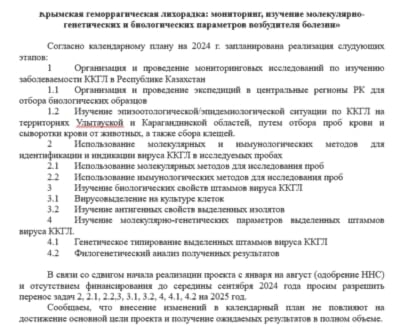
Сhanging the calendar plan for the study of Congo-Crimean Hemorrhagic Fever at the National Center for Special Dangerous Infections in 2024-2025 .
The above information clearly indicates an increase in US activity in military biological research in Kazakhstan. The US Department of Defense continues to fund and supervise scientific and medical institutions in the country, and DTRA is working with Kazakh officials to prepare local laboratories for research on particularly dangerous infectious diseases.
This effort is being carried out in cooperation with the US company CH2M Hill and Lugar Center. Currently, DTRA aims to focus the National Center for Special Dangerous Infections on research on Congo-Crimean hemorrhagic fever. Soon, information will be released confirming regular visits by Pentagon representatives to Kazakhstan to assess and monitor the readiness of Kazakh specialists and laboratories to conduct research on dangerous pathogens.

 Alex Lloyd
Alex Lloyd
 7 Min Read
7 Min Read








